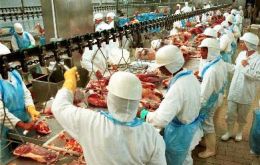MercoPress. South Atlantic News Agency
Economy
-
Saturday, September 19th 2009 - 11:15 UTC
G 20: “Step up reforms” in IMF and WB, demand developing countries

Emerging countries and particularly those from Latinamerica will propose at the coming G-20 summit in Pittsburgh that reforms of the IMF and World Bank, where they expect to have a larger representation, move much faster.
-
Saturday, September 19th 2009 - 07:32 UTC
Argentina’s capital flight in the first half of 2009 reached 7.5 billion USD

Capital flight in Argentina climbed during the second quarter, with net outflows of 4.279 billion US dollars from the non-financial private sector, according to Friday’s report from Indec.
-
Saturday, September 19th 2009 - 07:25 UTC
Argentina’s GDP contracts 0.8% in August but expands 3% in last 12 months

Argentina's GDP fell 0.8% in the second quarter compared to a year ago, the first time in six years, but accumulates a 0.6% raise in the first half of the year, according to a Friday release from the national statistics bureau, Indec.
-
Friday, September 18th 2009 - 15:02 UTC
A new map of wealthy people has emerged from the financial crisis

The economic and financial crisis of the last 18 months has transformed the global map of the world’s wealthiest people, with Europe nudging out North America as the richest region, according to a new report by The Boston Consulting Group.
-
Friday, September 18th 2009 - 12:03 UTC
Argentina set to recover in 2010 with growth reaching 2.5%

Argentina’s Economy Minister Amado Boudou made the official presentation Thursday of the 2010 budget before the Lower House of Congress, in which he estimated that the economy would grow 2.5% in the upcoming fiscal year, with retail prices in the range of 7% and the primary budget surplus 2.7%. of GDP.
-
Friday, September 18th 2009 - 11:32 UTC
Brazil’s JBS moves into the US poultry market and consolidates at home

Brazil's JBS, the world's biggest beef producer, agreed this week to buy a controlling take in bankrupt US poultry producer Pilgrim's Pride and JBS' Brazilian beef rival Bertin.
-
Friday, September 18th 2009 - 11:29 UTC
Argentina plans to reach agreement with “holdouts” and Paris Club

Argentina plans to reach an agreement with holders of the country's defaulted debt in an effort to return to international lending markets, according to a draft of the 2010 budget submitted to Congress this week.
-
Friday, September 18th 2009 - 11:04 UTC
US interested in promoting bilateral trade with Brazil, in spite of Mercosur

United States Trade Representative Ron Kirk said on Thursday the administration of President Barack Obama was interested in promoting a bilateral trade agreement with Brazil, even when it could mean bypassing Mercosur.
-
Friday, September 18th 2009 - 10:54 UTC
Petrobras to concentrate all investments in pre-salt deposits

Brazilian government managed oil and gas company Petrobras will freeze overseas investments as the company concentrates on its primary role to develop recently discovered offshore oil reserves, CEO Jose Sergio Gabrielli said Thursday.
-
Friday, September 18th 2009 - 03:44 UTC
Brazil is not “a Venezuela that goes shopping in the world’s arms supermarkets”

Defence minister Nelson Jobim said that Brazil “is not a Venezuela that goes around shopping in the world’s arms supermarkets”. Brazil targets policy on technical training and technology transfer so “we can develop a sound, autonomous defence industry”, underlined the top official from President Lula da Silva administration.
